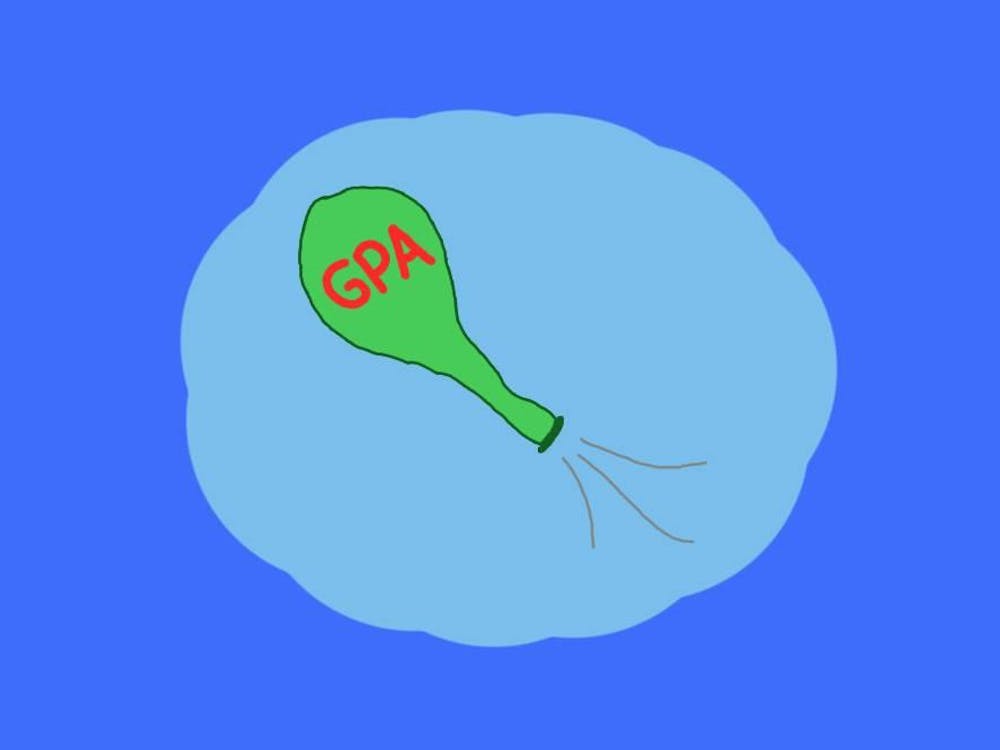ON SUNDAY night, two friends and I went to work out at the Aquatics and Fitness Center. Unfortunately, preparations were underway for the annual first-year bash and we were unable to get in. We continued our quest for physical exercise, making the trip to Slaughter Gymnasium.
We walked in, hoping to play a quick game of basketball before hitting the weights, and proceeded to the check-in counter. I handed the man my ID, as did my friend. My other friend had forgotten his wallet. He apologetically asked if he could just give his ID number. The Slaughter employee was sympathetic, yet sternly informed us that an ID wasn't sufficient: My friend would have to pay $5.
My incredulous friend asked why he had to pay to use the gym, when the honor system seemingly would insure that he could be taken on his word, or at least that we could vouch for him. We had shown our IDs - couldn't we be trusted? The Slaughter employee seemed to care, but had no choice but to inform us that while he didn't make the policies, he had to enforce them. Apparently we had to check honor at the door.
I know that this has happened to many people. After all, when you're going for a jog or getting into your workout clothes, your wallet is not usually the first item you grab. Moreover, nothing is more annoying than getting all the way to the gym only to be asked for $5. That's on top of the $20 grand or so that you're already paying to come here.
The episode becomes even more frustrating when you begin to consider the hypocrisies of the policy.
After all, our tradition of honor implies that a University student should be taken at his word. Indeed, a trip to O-Hill without a wallet yields much different results. Write down your ID number, sign a sheet and you're on your way to a nutritious and delicious meal.
One call to the Office of the Registrar, and you can inquire as to the status of your accounts using your ID number as your identification. You cannot, however, work out in a gym without your ID.
This and other incongruities indicate several flaws in the overall state of the honor system and student self-governance. Both are suffering due to waning faith on the part of both students and administrators.
The Slaughter scene may seem insignificant, but the point is that student authority is being undermined. If your word isn't sufficient at Slaughter, perhaps the professor you were talking to doesn't fully believe your story. If we can't trust students to vouch for each other at the gym, can we trust them to govern themselves? The policy is an example that sometimes student self-governance is a hollow phrase.
During the past few years a number of incidents have undermined the community of trust. These individual incidents tear the fabric of our community, and erode the trust that makes it possible.
The most devastating blow was last year's judiciary debacle. Although Richard Smith was found guilty in criminal court of assaulting fellow College student Sandy Kory, the University Judiciary Committee was unable to expel him without administrative interference.
Instead of the Committee's verdict going into effect, the case languished for a year, shuttling between the Office of the Vice President for Student Affairs, the Judicial Review Board, the Judiciary Committee, and so on until a decision finally was reached.
A fact-finding panel - appointed by William W. Harmon, vice president for student affairs - suggested a suspension of two semesters. Wisely, President John T. Casteen III chose a stronger punishment and forced Smith to leave school, suspending him for two years. Although Smith was removed from the University, the sanction is temporary - the Judiciary Committee expelled him permanently.
The final decision was not delivered by Smith's peers. Instead it was a case of students almost getting to govern themselves. The easiest conclusion is that student self-governance may continue until the lawyers show up and big money starts intimidating people. Smith was suspended, but not because the students had decreed it so or because their decision was trusted and respected. He was suspended because President Casteen said so.
Unfortunately, that was not the only time student sentiment was undermined recently. Two years ago, fraternity rush was moved from fall semester to the spring. The administration decided what was best for the students and then the change was enforced. Students were allowed to run their own organizations, until the administration decided they ought to be run differently.
Any fraternity that failed to comply would not have been allowed to affiliate with the University or participate in rush. Perhaps the change was good, but nevertheless, it was made against the will of students and without an abundance of support.
Similarly, the decision made this past year to displace student groups from Peabody Hall was made without student input, despite the number of student groups housed there. Now, the dean of students enjoys a studentless building, while organizations like The Declaration moved into offices the size of my bathroom.
If we fail to support, continue and expand student self-governance, then the University will become a hypocritical institution. So much of our image - the supposed honors of honor - is based on the one central concept of student self-governance.
It would be convenient if I could go to the AFC without my ID card. However, I am more concerned about the difference between the University's stated and actual ideals, between the trust it says it grants to students and what it actually demonstrates. I want to believe the hype, and not have to check my honor at the door.
(Nick Lawler is a Cavalier Daily associate editor.)




